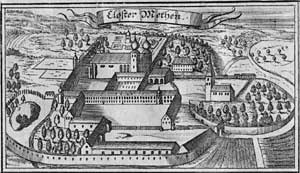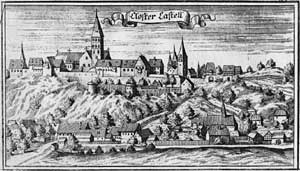
Metten Abbey, or St. Michael's Abbey at Metten is a house of the Benedictine Order in Metten near Deggendorf, situated between the fringes of the Bavarian Forest and the valley of the Danube, in Bavaria in Germany.

Ilmmünster Abbey was a collegiate foundation (Kollegiatstift) of canons, formerly a Benedictine monastery, in Ilmmünster, Bavaria, Germany. The church continues in use as a parish church.
Fischbachau Priory was a Benedictine monastery located in Fischbachau, Bavaria, Germany.

Saint Emmeram's Abbey was a Benedictine monastery founded around 739 at Regensburg in Bavaria at the grave of the itinerant Frankish bishop Saint Emmeram. The original abbey church is now a parish church named St. Emmeram's Basilica. The other buildings on the site form a large complex known as Schloss Thurn und Taxis or Schloss St. Emmeram, which has served as the main residence of the Thurn und Taxis princely family since the early 19th century.

Kastl Abbey is a former Benedictine monastery in Kastl in the Upper Palatinate, Bavaria.

Rinchnach Priory was a Benedictine monastery at Rinchnach in Bavaria, Germany.

Oberalteich Abbey was a Benedictine monastery in Bogen, Bavaria, Germany.

Vornbach Abbey was a Benedictine monastery in Neuhaus am Inn in Bavaria, Germany.

Garsten Abbey is a former Benedictine monastery located in Garsten near Steyr in Upper Austria. Since 1851, the former monastery buildings have accommodated a prison.

Aldersbach Abbey is a former Cistercian monastery in the community of Aldersbach in the district of Passau in the valley of the Vils, Lower Bavaria, Germany.

Schönau Abbey in Schönau in the Odenwald, in the Rhein-Neckar-Kreis in Baden-Württemberg, was a Cistercian monastery founded in 1142 from Eberbach Abbey. The present settlement of Schönau grew up round the monastery.

St. Burchard's Abbey was a Benedictine monastery in Würzburg, Germany, initially known as St. Andrew's Abbey. It was the first abbey established in Würzburg, founded ca. 750. In 1464, it was transformed into a Stift.

Michaelsberg Abbey or Michelsberg Abbey, also St. Michael's Abbey, Bamberg is a former Benedictine monastery in Bamberg in Bavaria, Germany. After its dissolution in 1803 the buildings were used for the almshouse Vereinigtes Katharinen- und Elisabethen-Spital, which is still there as a retirement home. The former abbey church remains in use as the Michaelskirche.

Höglwörth Abbey is a former monastery of the Augustinian Canons in Höglwörth, near Anger in Bavaria, in the Archdiocese of Munich and Freising.

Baumburg Abbey is a former monastery of Augustinian Canons Regular in the northern Traunstein district of Bavaria, Germany. It was founded in 1107–1109 and dissolved in 1803. Today Baumburg is a Catholic deanery that covers the parishes of the northern Chiemgau.

Kloster Engelberg is a Franciscan monastery in Grossheubach in Bavaria, Germany. In the past, a pilgrimage dedicated to a figure of Mary, documented as far back as 1406, was administered by the Capuchins after 1630. Following secularization in the early 19th century, the Capuchins eventually left and the Franciscan order took over the abbey and caring for the pilgrims. The abbey is (partially) open to the public.

Neustadt am Main Abbey was an abbey of the Benedictine Order in Neustadt am Main, Bavaria, Germany. It existed from the 8th century until the dissolution of abbeys in the course of secularization in 1803. During its heyday in the early Middle Ages, the abbey was a political power that vied for regional influence with the Prince-bishops of Würzburg, the Archbishops of Mainz and the Counts of Rieneck. Today its location is occupied by a monastery operated by the nuns of the "Dominican Order of Saint Catherine of Siena", also known as Kloster Neustadt. The former abbey church today serves as the Catholic parish church for Neustadt.

The Collegiate Church of Saints Philip and James, Altötting, with the associated college or community of secular canons, was founded in about 1228 in Altötting, Bavaria, southern Germany.

Christoph Langenmantel or Christoph Langenmantel vom Sparren was a nobleman, Carmelite friar, canon of Freising and a supporter of Martin Luther.

The Babonen family were influential nobles from Bavaria in the Early and High Middle Ages. They are also known as Babones, Papones, Pabones, Puapones, Poppones, Papones, etc. and should not be confused with their possible ancestors the Popponids.




















